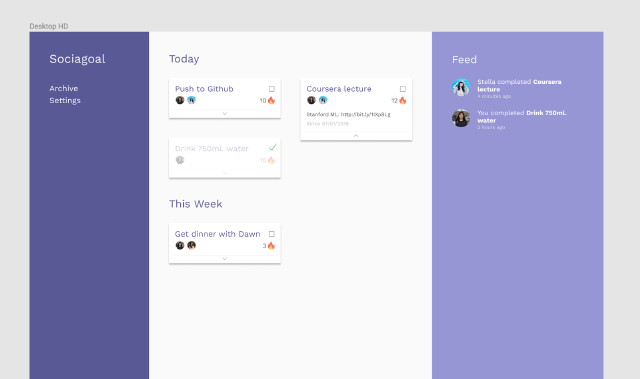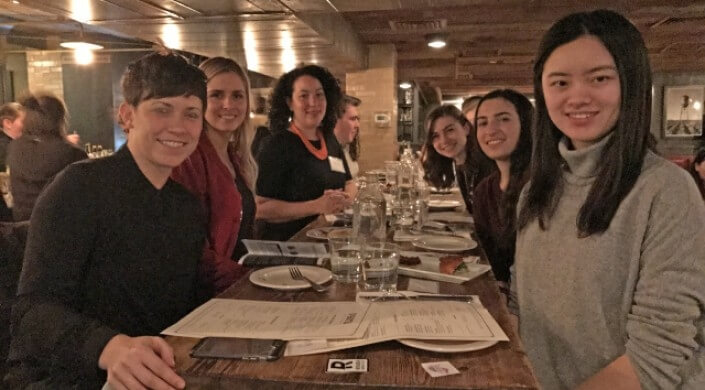News
The Four94 Scratchpad Fellows gather to celebrate the success of the program. (Photo courtesy of Four94.)
While women start twice as many businesses as men, nearly 90 percent are sole proprietorships, rather than high-risk startup ventures. In fact, only 17 percent of startups have a female founder, according to a recent report from CrunchBase.
Four94 aims to boost the number of female founders. The student-led initiative at the Harvard John A. Paulson School of Engineering and Applied Sciences (SEAS) launched an accelerated fellowship program in January to help young women develop more entrepreneurial confidence.
The four-week Scratchpad Fellowship offered mentorship, business resources, tutorials, and a community for prospective entrepreneurs.
The fellowship was based on the four-week test developed and written about by Avni Patel Thompson, a Harvard Business School (HBS) graduate who recently launched her second company, Poppy, after enduring the failure of her first venture, said Four94 co-founder Janet Chen, A.B. ’19, a computer science concentrator. Chen and co-founder Risham Dhillon, A.B. ’18, a computer science concentrator, met Patel Thompson while interning in Seattle.
“After her first startup failed, she had only about $200 left to devote to her ventures. Avni said ‘Okay, I’m going to give myself four weeks to see if this idea is viable. If it fails, I’ll go back to my normal job and move on,’” Chen said. “Given that time and limited resources, she become more scrappy, finding creative solutions that ended up proving her idea’s viability faster and with fewer resources than she thought possible. We thought, how great would it be to bring this test-drive experience to college students?”
The students added two important elements to create the fellowship—mentorship and community. Each of the five selected fellowship teams was paired with a mentor with relevant experience. A team that needed help with design, for instance, was matched with a mentor from design firm IDEO, Chen explained.
The program also involved weekly calls, video chats, and a Facebook group where fellows shared ideas, questions, and encouragement with one another.
Having the support of like-minded female founders was paramount for Tariana Little, a DrPH candidate at the T.H. Chan School of Public Health who entered the fellowship seeking a push to launch her second startup, FooFii, an app that provides resources for food insecure families.

For Tariana Little, a DrPH candidate at the T.H. Chan School of Public Health, the Scratchpad Fellowship offered her the opportunity to build her venture, FooFii. (Photo courtesy of Four94)
“For women, saying what our goals are, just putting it out there, can be very intimidating. We’re not always encouraged to be risk takers or pioneers,” she said. “It was powerful to be in a community of women who shared their goals honestly. I had to face my fears and insecurities about all the things that could go wrong and focus on what I really want to do.”
Alisha Ukani, A.B. ’20, a computer science concentrator, said the fellowship helped her focus on the concept for her startup, which seeks to help people threatened with eviction. Ukani used the time to learn as much as she could, visiting homeless shelters, speaking with lawyers, and sitting in on an eviction mediation process.
During weekly group chats, Ukani and Little discussed challenges of user research groups and shared scripts. Bouncing ideas off other women entrepreneurs helped her build confidence, Ukani said.
“If you had asked me a year ago if I wanted to launch a startup, I would have said ‘no.’ I thought it would take so much work that I would need to drop out of school,” she said. “But having these four weeks to test out my idea showed me that it is feasible, and something I want to continue.”
For Su Yang, a sophomore studying computer science at MIT, access to business resources and tutorials was a huge help. Yang , who is developing a social goal-setting app, learned about conducting market research and designing interviews during weekly chats with her mentor, an HBS student.
“One of the most challenging parts of entrepreneurship for a computer science major isn’t really developing the actual product, it is the business side—learning how to talk to people and gather the information that you need,” she said. “The fellowship really forced us to condense and pick out which points were essential for us to move forward.”

This screenshot shows the social goal-setting app Yang developed during the fellowship. (Photo courtesy of Four94.)
The fellowship also served as a four-week test for Four94, which the students launched in September with a conference for aspiring women entrepreneurs. Four94 takes its name from the 4.94 percent of venture capital deals in 2016 that included a woman serving in a startup leadership role.
Inspired by the success of this year’s program, the co-founders have already begun tweaking elements of the fellowship for next year, Chen said.
“The goal is not to grow a big startup. The goal is not even to show that your idea is a good idea. Rather, the goal is to learn,” she said. “We want these fellows to believe that they can pursue an idea and that launching a startup is all very possible.”
Read blog posts from the Four94 ScratchPad Fellows.
Four94 acknowledges Harvard TECH, Rough Draft Ventures, and Cambridge Innovation Center (CIC) for their support in making the Scratchpad Fellowship possible.
Topics: Belonging, Entrepreneurship
Cutting-edge science delivered direct to your inbox.
Join the Harvard SEAS mailing list.
Press Contact
Adam Zewe | 617-496-5878 | azewe@seas.harvard.edu



